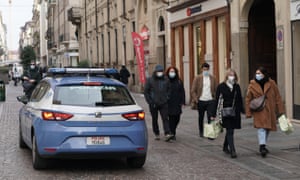
The easing of coronavirus restrictions in Italy from Monday has raised concern, with one expert forecasting a spike in infections within the next few weeks.
Sixteen out of 20 Italian regions are now in the lower-risk ‘yellow zone’, meaning bars and restaurants can serve until 6pm and people can travel more freely within their regions. The remaining four, including Umbria, Sicily, Puglia and Sardinia, are in the slightly more restrictive ‘orange zone’, along with the autonomous province of Bolzano.
A 10pm-5am curfew remains in place across the country, as does a ban on inter-regional travel unless for work or emergency reasons.
Italy registered 237 more coronavirus-related deaths on Sunday, bringing the total to 88,516 – the second-highest in Europe after the UK. There were 11,252 new infections, down from highs of over 40,000 in mid-November. The pressure on hospitals has been gradually easing, with 20,397 people currently in hospital with Covid-19, of whom 2,270 are in intensive care (down from over 3,600 in mid-November).

Infant and primary schools in Italy reopened in early January, while from Monday 50% of high school pupils across all regions, apart from Sicily, will return to the classroom.
Walter Ricciardi, a scientist advising the health ministry, said that while a lockdown akin to the one in place last spring is not needed, he would prefer the whole country to be under tougher ‘red zone’ restrictions.
Experts were concerned after seeing images of crowds of people in the shopping thoroughfares of major cities over the weekend.
Ricciardi predicts that the relaxation of restrictions will lead to a rise in infections “in two to three weeks”.
“The trend of this epidemic is now predictable,” he added. “It’s important to avoid gatherings but it seems to me that simple suggestions have no effect. If we add to this the reopening of schools, we will see an increase in cases.”
The government has been under pressure to ease restrictions from businesses, while teachers and pupils have been protesting against online learning.
Agostino Miozzo, the coordinator of the scientific panel advising the government, said: “The return to being a yellow area does not mean a return to normality.”


